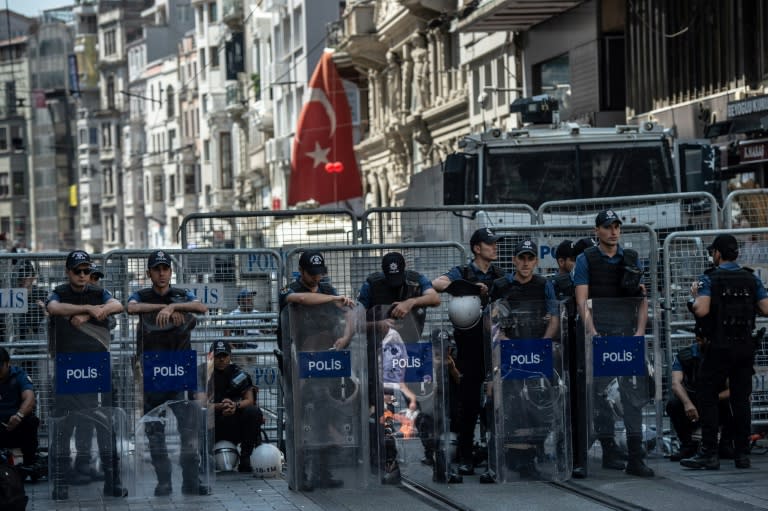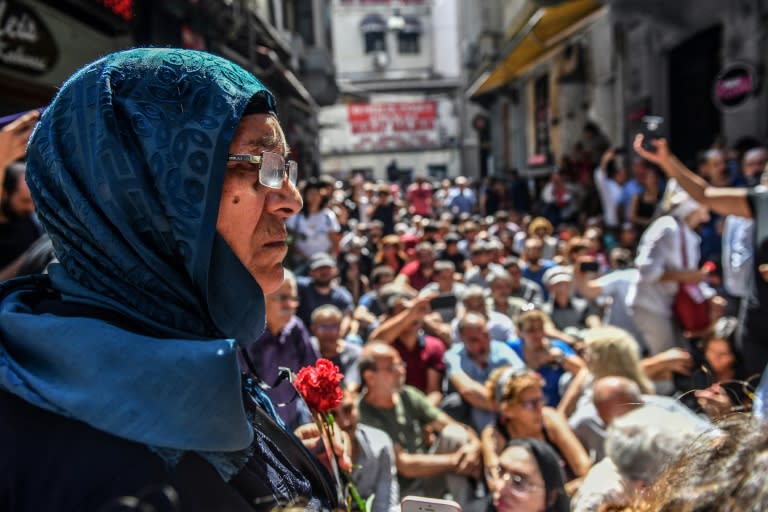Turkey's Saturday Mothers defy ban in search for sons
Hanife Yildiz, 66, says she last saw her only son, Murat, in 1995 -- when he was 19 and she handed him to Turkish police for questioning. She had brought Murat to a police station in the western city of Izmir, where he was wanted for interrogation over a cafe brawl. He never came back. The police later told Yildiz that Murat, who had been six months from starting his military service -- fled during the night, jumping from a ferry while being transported to Istanbul. Doubtful of this version of events, Yildiz joined a group of Turkish women with similar questions about the whereabouts of their loved ones. Calling themselves Saturday Mothers, the organisation moulded itself on those Argentinian women who protested for news of relatives who disappeared under the dictatorship of the 1970s and 80s. Since May 1995, the Turkish group -- made up in large part of elderly women -- has met in an Istanbul square on Saturdays. Police prevented the group from holding any protests for a decade from 1999 to 2009, but they then resumed without interference. Until last month, that is. On what would have been the women's 700th such protest, the police clamped down, using rubber bullets and water cannon to forcibly disperse them. Almost 50 were briefly detained, including 82-year-old Emine Ocak, a Saturday Mothers leader whose arrest shocked observers. The group has not been allowed to gather ever since, with the government accusing it of being exploited by a "terror organisation". In the latest confrontation, police deployed in large numbers on Saturday and erected metal barricades to stop the women from protesting. Defiant, Yildiz insists she will not back down. "We will not give up on our cause until the authorities show us our sons' gravestones. That's how I will prove my motherhood," she told AFP at the offices of the Human Rights Association in Istanbul. - 'Never-ending mourning' - Yildiz' fellow Saturday Mothers are equally determined. "There is a never-ending mourning over disappearances under detention. It will never come to an end unless we have a grave," Ocak's daughter Maside told AFP. The 1980s and 1990s were among the most turbulent periods in the history of modern Turkey, with the state fighting Kurdish rebels in the southeast, and left-wing extremists in urban centres. Activists accuse the secular authorities of the time of abuses in the arrest and treatment of hundreds of detainees. Saturday Mothers fear the current government under President Recep Tayyip Erdogan is not enthusiastic about unearthing the truth. The authorities have defended the clampdown on the group, which they claimed was being used by the outlawed Kurdistan Workers Party (PKK). "Should we have turned a blind eye to motherhood being abused by a terror organisation?" Interior Minister Suleyman Soylu asked a conference last month. Istanbul's authorities have claimed that calls to attend Saturday Mothers rallies were made through social media channels linked to the PKK. - 'Continue the search' - Maside Ocak's brother, Hasan, has not been seen since March 21, 1995, when his family say he was detained by police in Istanbul. Soylu said Hasan had belonged to a far-left extremist group, and that he was killed in a dispute between members. Even if this is true, "we demand a fair trial and that the culprits be punished," insisted his sister. "I saw pictures of Hasan's tortured body in forensic records. I was 19. (The image) has not left my eyes ever since," she said. "As long as this crime remains unpunished, we will continue to be here." Erdogan, when he was prime minister, met representatives of Saturday Mothers, including Yildiz, in 2011. His government's current crackdown on the group, however, is seen as a sign that official attitudes have hardened. Yildiz insisted she, too, would not give up. "If a mother does not search for her child then that motherhood has no meaning," she said. "He is my son."




